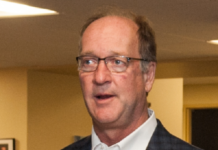A Senate panel has turned aside a proposal that would have expanded residents’ ability to force cities to enact laws through initiative petitions.
The Federal and State Affairs Committee on Monday decided against moving the bill, which would have allowed residents to petition for administrative changes.
The bill came about because of a zoning controversy in Prairie Village where a judge ruled against an initiative petition last year.
The proposal drew fierce opposition from cities, which said the bill could open the door for initiative petitions that could control the day-to-day functions of government.
They said it would have allowed residents to petition for everything ranging from how trash is collected to the material used to resurface streets.
Voters currently can only petition for regulatory changes in law, or something that creates new law.
They cannot petition for administrative changes, or something that defines how a law should be carried out or administered.
The bill would have eliminated the exception for administrative ordinances, which critics say is used to shield cities from initiative petitions intended to hold government accountable.
Republican state Sen. Mike Thompson, chair of the committee, amended the bill to remove the measure allowing petitions for administrative changes.
He replaced it with language that would have allowed residents to submit their petition to the city attorney to determine whether it complied with the law.
The goal, he said, was to give residents guidance before they undertook the effort of circulating an initiative petition.
Cities had some reservations about the idea, saying it could present a conflict for city attorneys who would be put in the position of providing legal advice to residents.
“The city attorney is there on behalf of the city and so this gives access to the citizenry to use the attorney services as part of that review process,” said Nathan Eberline, executive director of the League of Kansas Municipalities.
“They could then be in conflict with each other somewhere down the road,” he said.
The committee adopted the amendment but later killed the entire bill.
There was some concern that the bill was solely focused on fixing a political problem that emerged in Prairie Village last year.
The issue surfaced in Topeka after a judge ruled last year against a petition that would have restricted rezoning in Prairie Village.
The petition was rooted in a controversy over Prairie Village’s effort to rewrite zoning laws to allow for more duplexes, apartments and other affordable housing alternatives.
Residents testified that cities use the administrative exception to the initiative petition to ensure that the public can’t vote on important public policy matters.
However, the bill was set aside after Republican state Sen. Jeff Longbine of Emporia said he was concerned that the legislation could be used as a vehicle to adopt a broader law creating initiatives at the state level.
In Kansas, cities are the only level of government where residents can propose or initiate a local law signed by a set number of voters.
“I’ve got a little bit of heartburn about whether this legislation is for one city and how that fits with all,” Longbine said.
But Longbine said he thought the bill could be amended on the Senate floor to allow statewide initiatives that would be put to the voters and bypass the Legislature.
“I know that’s a stretch, but that’s a big concern of mine,” he said.
Thompson said he solicited a couple of opinions that suggested an amendment like that would not be germane to the bill.
But Longbine noted that as a former chair of the rules committee, there could be no guarantee of what would be considered germane.
Democratic state Sen. Cindy Holscher of Overland Park said the bill – as amended with the new language – would be an unfunded mandate on cities by requiring them to review every initiative petition that was submitted.
“It does feel like a lot of overreach in regard to something that happened in one community,” Holscher said.
“There are unintended consequences here that really have alarming concerns.”
















